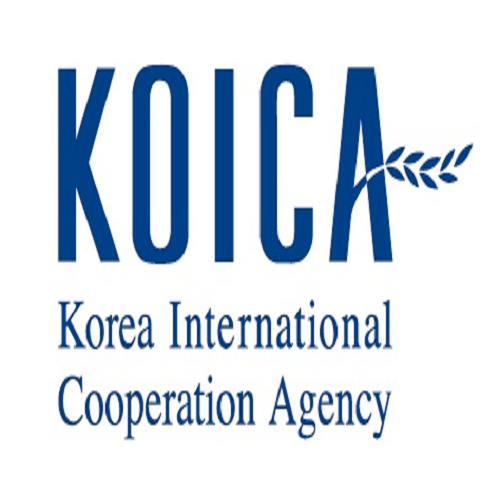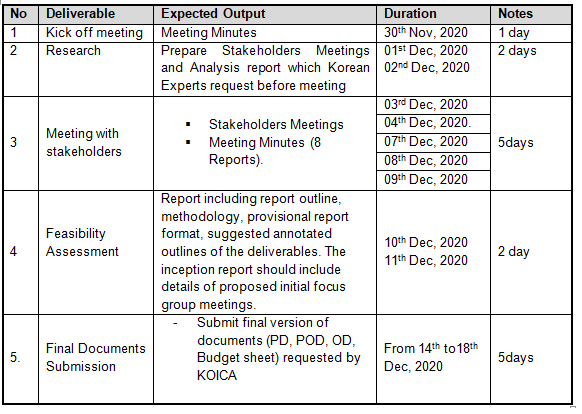Consultant Junior – Koica Retour vers les opportunités
Agence Coréenne de Coopération Internationale (KOICA)
Lance Appel à consultantsÉchéance
15 Novembre 2020 Il y a 5 ans
Critères d'éligibilité
Cliquez ici pour parcourir les critères d'éligibilitéPartager l'opportunité sur
Détails de l'opportunité
GENERAL INFORMATION
- Services/Work Description: Implementation of the “feasibility study” for the cooperation project between UNDP Tunisia and KOICA Tunisia: Strengthening inclusive local governance and economic development in Tunisia”
- Duty Station: Tunis, Tunisia
- Type of the Contract: Short term contract (Junior Consultant)
- Duration: 1 5 working days
- Expected Start Date: 30th Nov, 18th Dec (15days)
BACKGROUND / RATIONALE
After the 2014 Constitution and the new Local Authorities Code adopted in 2018, the national government has taken steps in supporting decentralization by holding local elections in 2018 and establishing new entities such as the Higher Commission for Local Finance in 2018 and the Ministry of Local Affairs in 2016. After 2019 legislative and presidential elections, the President of the Republic Kais Saied, has promoted local democracy as a major pillar of his program and the new Government highlighted “citizens involvement, decentralization and local power instauration” among the six pillars of its governmental approach.
Yet, there are still vital bodies to be established such as the Higher Councils for Local Groups to serve as a representative body for municipalities in addition to the Cities Federation that is chairs by a civil servant at the Ministry of Interior which is the former supervisory and regulatory ministry for local governments and the elections of the regional councils which are expected to be held in 2021-2022 cycle
The government through the Ministry of local affairs recently recognized that an assessment and ad hoc adjustments are legitimately required in order to find solutions to the inherent dysfunction in the achievement of the decentralization in Tunisia as a structural reform of such an ambition initially planned over a very long period. On July 15th, 2020, a national consultation on the decentralization process was launched after a five point’s diagnosis:
- Decentralization and deconcentration reforms are not yet consistent;
- The municipal councils are not yet stabilized;
- The institutions of decentralization are not yet all in place or functional (regional councils, High Council of Local Authorities);
- The administrative and financial autonomy of local collectivities has not yet been acquired;
- The development model from local to national has not yet been established.
The implementation strategy of this project is based on the integrated way to support local governance and local development of March 2016 and tailored to develop capacities for local governance and local development that is essential for delivering on the 2030 Agenda for Sustainable Development and the localization of the Sustainable Development Goals. Localizing development should not be seen as a translation of global policies within a local context, but rather as a process based on the empowerment of local stakeholders, aimed at making sustainable development more responsive and more relevant to local needs, aspirations and lives through sustained exchanges between the global, national and local levels. That’s why local and regional governments must be at the heart of the 2030 Agenda.
All partners – the government at all levels, civil society, private sector, development agencies need to work together to ensure steady progress on this transformative development agenda.
The Strengthening inclusive local governance and economic development in Tunisia project is built on UNDP’s achievements in the past five years in supporting decentralization and local governance through its technical support to promote integrity at the municipal level, urban and investment, service delivery, accelerator labs, support to youth and women, civil society and community participation, environment, and disaster and risk management, inclusive growth, socio-economic and local economic development and legislative support where all clusters will work jointly to achieve integrated strategic results.
The main objective of the feasibility study is to see and check the technical and financial feasibility of the activities / outputs proposed in the project concept paper submitted by UNDP Tunisia.
The duration of the project will be from 2022 to 2025 with a grant worth of 5 million USD.
OBJECTIVES OF THE SERVICE / WORK
The objectives of this feasibility study are to:
- Discuss and develop the possibilities of the implementation of the project.
- Conduct an assessment and a review on Tunisian status and needs in terms of local governance – local development – fiscal decentralization – …
- Produce a detailed analysis about the local governance/local development strategies and achievements in Tunisia
SCOPE OF THE WORK / METHODOLOGY / APPROACH OF THE SERVICE
- Analyze and provide advisory about the study to KOICA experts – conduct and assist field study activities based on demand of the Korean experts.
- Provide timely and necessary inputs needed for the study.
- Analyze the Tunisian situation related to the local governance/local development sectors: institutional aspects –strategies– coordination between stakeholders – …
- Organize and join meetings with stakeholders involved in the project and prepare the outputs of these meetings.
- Liaison between Korean and Tunisia experts / officials / stakeholders – Manage communication between KOICA study team and Tunisian counterpart ministries and related organizations.
- Establish and maintain the regular communication with Korean experts for study implementation (online meetings / mailing / …)
- Co-develop with Korean experts the preliminary Project Document (PD), Project Output Description (POD), Output Description (OD) and Budget Sheet (detailed budget for each project components) based on above mentioned comprehensive analysis with KOICA.
The Junior Consultant is expected to support the consultant to develop a study report which includes the following:
- Outline the proposed methodology and/or approach expected to be employed including the use of primary data or review and analysis of relevant secondary data sources.
- Review current literature and data on local governance / local development / fiscal decentralization to identify and determine areas that may be suitable for project implementation.
- Provide in-dept analysis (SWOT) for the project implementation.
- Analysis of existing policies, and best practices for recommendations.
- Evaluate stakeholders and data provided by other programs/donors.
- Propose key recommendations.
The following activities will be undertaken:
- Initial meeting with a focus group: Initial focus group meeting/kick off meeting with KOICA, Korean experts and UNDP Tunisia to determine and discuss the parameters of the TOR and to review the scope of work.
- Paper review: The consultant will conduct paper review to learn about local governance / local development / fiscal decentralization in Tunisia.
- Consultative meetings: Consult relevant stakeholders to find out how the issues concerning local governance / local development / fiscal decentralization have been addressed and assess their views.
TENTATIVE TIME FRAME OF THE WORK / DELIVERABLES / OUTPUT
REPORTING / INSTITUTIONAL ARRANGEMENT
Within the framework of the present mandate, the Junior Consultant will support the consultant to:
- Produce a final report of the feasibility study (in English).
- Provide Korean experts with needed documents during the implementation of the mission.
- Ensure the translation of documents and during meetings if needed (English/French – French/English).
- Prepare Meeting Minutes in English.
The work will be guided under the auspices of KOICA Tunisia office. However, the consultant will be expected to actively work with the Korean Expert team.
Note: The above mentioned tasks to be performed are intended as a guide and should not be viewed as an inflexible specification as it may be modified following discussion with the selected Junior Consultant.
Critères d'éligibilité
- A minimum of 5 years of proven experience of working in local governance / local development (policy – diagnosis - …) and fiscal decentralization
- Good experience in project management
- Good understanding of the local governance and decentralization sectors in Tunisia
- Strong experience in the organization/animation of multi-stakeholders meetings
- Strong experience in drafting Meeting Minutes in English
- Flexibility to adapt to any subsequent changes in the terms of reference
- Ability to provide general leadership and direction to the study/research analysis and report writing
- Excellent research relating to local governance
- Ability to undertake technical policy-focused research related to local governance / local development sectors
- Excellent written and verbal communication skills
- Fluent in English and French (Korean is preferable)
L'opportunité a expiré
Cette opportunité n'est malheureusement plus disponible sur Jamaity. Visitez régulièrement la rubrique opportunités pour ne plus en rater.
Suivez Jamaity sur LinkedIn
Obtenez Jamaity Mobile dès maintenant

Appel à consultants Publié sur Jamaity le 5 novembre 2020
Découvrez encore plus d'opportunités sur Jamaity en cliquant sur ce lien.


